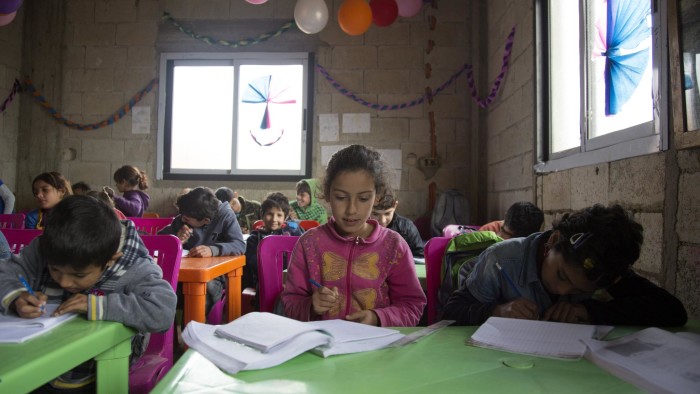Refugee charity helps educate Syria’s ‘lost generation’

Roula Khalaf, Editor of the FT, selects her favourite stories in this weekly newsletter.
Standing outside her muddied tent, Layal cannot remember how old she is. She cannot tell how many months it has been since her family fled Syria, because at 10 years old, Layal still does not know how to count.
Amid the air and artillery raids, 200,000 killed and millions displaced, Syria’s other tragedies are easy to overlook. But one of the most dangerous crises the country may face is a generation of children that grows up without an education.
About 3m Syrian children are out of school, according to Unicef.
“Think about 10 years from now — what is going to happen if these children don’t know how to read and write, don’t know mathematics, if they don’t have the most basic skills?” says Serena Borsani, of the International Rescue Committee the aid organisation selected by the Financial Times for this year’s seasonal appeal.
Unicef warns of a “lost generation” in Syria. It says children, about half of Syria’s 11m displaced, will lack the skills the country will need to rebuild when the civil war ends. In the meantime, it will be harder for youths to avoid getting dragged into Syria’s cycle of violence without an education to help them find jobs.
The IRC and other humanitarian groups are now trying to provide education for children who have spent three years fleeing war and scraping by as refugees.
In Lebanon’s northern Akkar region, refugee families rig faded tarpaulin billboards advertising shoes and villas to make tents in the settlement Layal now calls home. But today, instead of sitting with her mother all day, she and her siblings grab identical green IRC backpacks and head to the large white tent the group has built as an unofficial classroom.
Of the 28 pupils inside, aged 9-13, many never had a chance to start school before Syria’s four-year civil war began. Most of Layal’s other classmates forgot all their schooling after so many years without education.
Of the almost 5,000 students the IRC teaches, nearly half were unable to test into the most basic educational level, which requires them to identify letters and numbers.
Inside the IRC tent, children recite the Arabic alphabet and sings songs in English and French. Rows of feet flail beneath long white desks — some covered only in mud-caked sandals despite it being the middle of winter.
“I didn’t think I’d ever go to school, so I got excited when I heard about this,” Layal says.
But like many of the children in her camp, she was too embarrassed to come to classes at first. Layal is still learning to hold a pencil, and is keenly aware of how far behind she is.
“I told her it’s better she starts learning now than getting even older and still not knowing anything,” says Layal’s teacher Mayada Shular. “She can catch up along with everyone else now.”
About one in five schools in Syria are closed because of the violence, Unicef says — either destroyed in shelling or converted into refugee housing.
FT Seasonal Appeal: The International Rescue Committee

The FT has chosen the International Rescue Committee as its partner in the 2014-15 Seasonal Appeal. IRC is a global charity that helps people whose lives and livelihoods have been shattered by conflict and disaster. It works in more than 30 countries to help people survive, recover and gain control over their future.
Read more about the IRC’s work
IRC calls its educational programmes in Lebanon “non-formal education”, because although they follow state curriculums, the classes are not officially recognised. Lebanon, which bears one of the region’s biggest refugee burdens with over a fifth of its population now Syrian, wants all children integrated into its state schools.
The government is rotating students through two shifts of schooling to increase the number of refugee students — currently 200,000 — that it can educate. That still leaves 200,000 other children without formal education. So far, the IRC and other organisations reach about 40,000 with their programmes.
Because resources are limited, teachers working with IRC often teach children at completely different grade levels.
“I have students in grades 5,4, 2, 1, as well as kids with nothing at all. They’re all in the same class,” says Nawal, who teaches in an abandoned building near another refugee camp.
She crams about 20 students into a dark cement room and splits them into teams for each lesson, rotating among tables to help each group.
“They shocked me — I wasn’t expecting to have kids who didn’t know how to write a letter,” Nawal says. “But now they’ve shocked me again — they’re already starting to read, to learn English and French, to write. I’m really proud of them, they’ve gotten so much better.”
Teachers say another problem is the psychological effect of the war. Both Nawal and Ms Shular spent the first few weeks of classes convincing students not to yell or hit each other.
“You’d hear them say things like, ‘If you talk to me that way I’ll shoot you.’ They’d just absorbed all the violence they’d seen,” Nawal says.
In Ms Shular’s tent in Lebanon, children’s sketches of trees and dogs hanging from the ceiling are interspersed with drawings of tanks firing rockets into houses. She says she encourages them to draw anything they want.
“I want them to get it out, and rest their mind. This is the hardest thing I’ve ever done,” she sighs. “But when you see them take the pen and move it on their own, it feels like the biggest victory.”
To read all the FT’s seasonal appeal stories, and to donate, go to ft.com/seasonalappeal. Throughout the seasonal appeal donations are being matched by the UK government, with all match funding going towards the IRC’s work with Syrian refugees
Comments